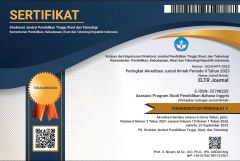USING FLASHCARDS TO IMPROVE RUMAH CITTA LABSCHOOL STUDENTS’ VOCABULARY
Abstrak terlihat: 334 / PDF terunduh: 352DOI:
https://doi.org/10.37147/eltr.v1i2.91Keywords:
vocabulary, flashcards, classroom action research, Rumah Citta LabschoolAbstract
Vocabulary plays an important role in learning English. Improving vocabulary especially for children is needed to prepare them for their future. There is a media named flashcards that can be used to learn English for children and make the learning process more fun. This research aims to know how flashcards improve Rumah Citta Labschool students’ vocabulary. There are two research questions: 1) How are flashcards implemented to improve Rumah Citta Labschool students’ vocabulary? and 2) How do flashcards improve Rumah Citta Labschool students’ vocabulary? The researcher used Classroom Action Research as the methodology. In this research, there were seven participants. They were five students of English Club and two educators who were chosen by the school as the collaborators to avoid bias. In order to collect the data, the researcher used some instruments; they were field note observation, pre-test and post-test. The data of this research were in the form of qualitative and quantitative. Qualitative data were taken from the observation result and quantitative data were taken from the pre-test and post-test results. There was an increase in the average score from the pre-test to the posttest. It showed that using flashcards has really improved Rumah Citta Labschool students’ vocabulary.
Downloads
References
Alqahtani, M. (2015). The importance of vocabulary in language learning and how to be taught. International Journal of Teaching and Education, 3(3), 2.
Baleghizadeh, S. & Ashoori, A. (2011). The impact of two instructional techniques on EFL learners’ vocabulary knowledge: Flash cards versus word lists. MEXTESOL Journal, 35(2), 4.
Barani, G. (2013). Language learning and vocabulary. International Journal of Basic Sciences and Applied Research, 2(1), 87-90.
Fadlillah, M. (2017). Buku ajar bermain & permainan anak usia dini. Jakarta: Kencana.
Ferrance, E. (2000). Action research. USA: Brown University.
Harmon, J. M., Wood, K. D., & Keser, K. (2009): Promoting vocabulary learning with interactive word wall. Middle School Journal, 40(3), 58-63.
Haycraft, J. (1978). An introduction to English Language Teaching. England: Longman.
Heigham, J. & Croker, R. A. (Eds). (2009). Qualitative research in applied linguistics: A practical introduction. New York: Palgrave Macmillan.
Kawulich, B. (2015). Data analysis techniques in qualitative research. In Qualitative data analysis technique. Retrieved on June 6, 2018, from https://www.researchgate.net/publication/258110388_Qualitative_Data_Analysis_Techniques.
Khasinah, S. (2013). Classroom action research. Journal Pionir, 1(1), 108.
Montessori, M. (2008): The absorbent mind pikiran yang mudah menyerap. Yogyakarta: Pustaka Pelajar.
Nixon, C. & Tomlinson, M. (2003). Primary vocabulary box: Word games and activities for young learners. Cambridge: Cambridge University Press.
Rasouli, F. & Jafari, K. (2016). A deeper understanding of L2 vocabulary learning and teaching: A review study. International Journal of Language and Linguistics, 4(1), 40-46.
Sutarsana M, I. G. G. E. (2013). Improving vocabulary mastery through word tree branch technique at seventh grade students of SMPN 1 Bebandem. Denpasar: Mahasaraswati University.
Sutresno, Y. T. A. (2017). Using flashcards to improve 7th grade students’ vocabulary: A classroom action research in SMP Maria Immaculata Yogyakarta. Yogyakarta: Sanata Dharma University.
Tamayo, K. G., Gaviria, N. O., & Rivas, Y. A. P. (2016). Teaching vocabulary through flashcards to preschoolers. Pereira Risaraldapp: Universdad Technologica de Pereira.
The Hanen Centre, Helping You Help Children Communicate. (2016).
Theresiawati, S. & Timotius, A. I. (2017). Vocabulary learning strategies used by English department students. English Language Teaching and Research Journal, 1(2), 28-43.
Downloads
Published
How to Cite
Issue
Section
License
Copyright (c) 2017 Elizabeth Atyasanti Sekar Wening

This work is licensed under a Creative Commons Attribution-ShareAlike 4.0 International License.











 ELTR Journal,
ELTR Journal, 